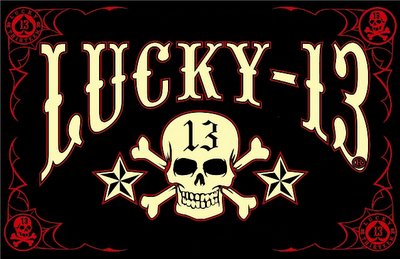 13: The Devil's Dozen
13: The Devil's DozenIt is said: If 13 people sit down to dinner together, all will die within the year. The Turks so disliked the number 13 that it was practically expunged from their vocabulary (Brewer, 1894). Many cities do not have a 13th Street or a 13th Avenue. Many buildings don't have a 13th floor. If you have 13 letters in your name, you will have the devil's luck (Jack the Ripper, Charles Manson, Jeffrey Dahmer, Theodore Bundy and Albert De Salvo all have 13 letters in their names). There are 13 witches in a coven.
Superstitions deem today as a day of impending doom of bad luck. The most common stemming from the Last Supper, at which Judas Iscariot was said to have been the thirteenth guest to sit at the table. Judas later betrayed Jesus, leading to His crucifixion, and then took his own life. This Christian symbolism is reflected in early Western references to thirteen as a omen of bad fortune, which generally started to appear in the early 18th century and warned that thirteen people sitting down to a meal together presaged that one of them would die within the year.
One theory, most recently propounded in the novel "The Da Vinci Code," holds that it came about not as the result of a convergence, but a catastrophe, a single historical event that happened nearly 700 years ago. The catastrophe was the decimation of the Knights Templar, the legendary order of "warrior monks" formed during the Christian Crusades to combat Islam.
Renowned as a fighting force for 200 years, by the 1300s the order had grown so pervasive and powerful it was perceived as a political threat by kings and popes alike and brought down by a church-state conspiracy
Other sources suggest the number 13 was purposely vilified by the founders of patriarchal religions in the early days of western civilization because it represented femininity. Thirteen had been revered in prehistoric goddess-worshiping cultures, allegedly, because it corresponded to the number of lunar (menstrual) cycles in a year (13 x 28 = 364 days). The "Earth Mother of Laussel," for example, a 27,000-year-old carving found near the Lascaux caves in France often cited as an icon of matriarchal spirituality, depicts a female figure holding a cresent-shaped horn bearing 13 notches. According to this theory, as the solar calendar triumphed over the lunar with the rise of male-dominated civilization, so did the number 12 over the number 13, thereafter considered anathema.
Norse mythology tells us twelve gods were invited to a banquet at Valhalla. Loki, the Evil One, god of mischief, had been left off the guest list but crashed the party, bringing the total number of attendees to 13. True to character, Loki raised hell by inciting Hod, the blind god of winter, to attack Balder the Good, who was a favorite of the gods. Hod took a spear of mistletoe offered by Loki and obediently hurled it at Balder, killing him instantly. All Valhalla grieved. And although one might take the moral of this story to be "Beware of uninvited guests bearing mistletoe," the Norse themselves apparently concluded that 13 people at a dinner party is just plain bad luck.
In pagan Rome, Friday was execution day (later Hangman's Day in Britain), but in other pre-Christian cultures it was the sabbath, a day of worship, so those who indulged in secular or self-interested activities on that day could not expect to receive blessings from the gods — which may explain the lingering taboo on embarking on journeys or starting important projects on Fridays.
To complicate matters, these pagan associations were not lost on the early Church, which went to great lengths to suppress them. If Friday was a holy day for heathens, it must not be so for Christians — thus it became known in the Middle Ages as the "Witches' Sabbath," and thereby hangs another tale.
The Witch-Goddess
The name "Friday" came from a Norse deity worshipped on the sixth day, known either as Frigg (goddess of marriage and fertility), or Freya (goddess of sex and fertility), or both, the two figures having become intertwined in the handing-down of myths over time (the etymology of "Friday" has been given both ways). Frigg/Freya corresponded to Venus, the goddess of love of the Romans, who named the sixth day of the week in her honor "dies Veneris."
Friday was actually considered quite lucky by pre-Christian Teutonic peoples, we are told — especially as a day to get married — because of its traditional association with love and fertility. All that changed when Christianity came along. The goddess of the sixth day — most likely Freya in this context, given that the cat was her sacred animal — was recast in post-pagan folklore as a witch, and her day became associated with evil doings.
Various legends developed in that vein, but one is of particular interest: As the story goes, the witches of the north used to observe their sabbath by gathering in a cemetery in the dark of the moon. On one such occasion the Friday goddess, Freya herself, came down from her sanctuary in the mountaintops and appeared before the group, who numbered only 12 at the time, and gave them one of her cats, after which the witches' coven — and, by tradition, every properly-formed coven since — comprised exactly 13.
Sarah Winchester herself had a fasination with the number 13. Nearly all of the windows contained 13 panes of glass; the walls had 13 panels; the greenhouse had 13 cupolas; many of the wooden floors contained 13 sections; some of the rooms had 13 windows and every staircase but one had 13 steps; 13 palm trees lined the driveway; right down to the 13 drain holes in the kitchen sink. All the gas chandelier's were even modified to 13 lights. Sarah would also throw lavish dinner parties with the table set with 13 place settings; one for herself, the other 12 for whom the dinner parties were held for; her guests of honor of course, ghosts. These are just to name a few.
When Sarah Winchester wrote her will, it was written in 13 parts and signed 13 times. Why was she fascinated with the number thirteen? Some say Sarah built the Winchester House so oddly to confuse the spirits that pursued her. I believe that she regarded 13 to be anything but unlucky. Why else would she have lived in a house that had the number 13 so pominently displayed?
How do I feel about Friday the 13th? Well, my black cat, Sable, and I are going to the cemetery tonight to worship to the Goddess, Freya.














No comments:
Post a Comment